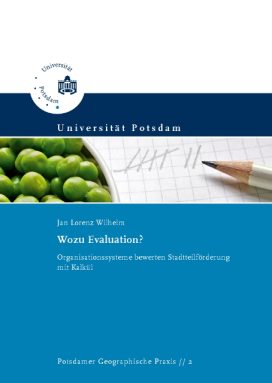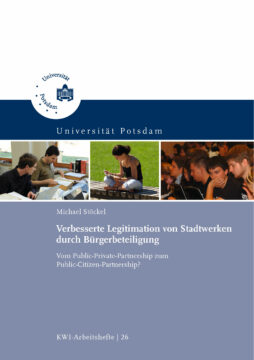The neighborhood development program “Social City” aims to discontinue the downward tendency of so-called disadvantaged neighborhoods by funding numerous projects. In the course of the program implementation, the method of evaluation – as a target-performance analysis – becomes more and more relevant. But whether something can be called a successful neighborhood management or a successful measure of integration strongly depends on its context and the point of view. For this reason evaluation research says that the effects of programs are usually only indicated unsatisfactorily. These observations lead to the research aim, to explain the function of evaluations for the constitution of development programs beyond usual arguments of effectiveness and efficiency. Using a system theoretical approach Wilhelm analyzed the explicit and implicit norms and observation schemes of a successful program implementation. The following theses on the role of evaluations in program implementations can be derived: a) Evaluations lay down the change in the distinctions of political intervention and facilitate communication about success,b) Evaluations manifest the differentiation between underprivileged and privileged neighborhoods in the program and help to legitimate it, c) evaluations actualize the funding programs’ ability to absorb insecurity and finally d) evaluations take the “illusion of control” inherent to every political strategy of intervention as a basis and thus contribute to its manifestation.
Organisationssysteme bewerten Stadtteilförderung mit Kalkül
ISBN: 978-3-86956-187-5
302 pages
Release year 2012
Series: Potsdamer Geographische Praxis , 2
15,00 €
Non-taxable transaction according to § 1 (1) UStG/VAT Act in combination with § 2 (3) UStG/VAT Act a. F. Providing this service, the University of Potsdam does not constitute a Betrieb gewerblicher Art/Commercial Institution according to § 1 (1) No. 6 or § 4 KStG/Corporate Tax Act. If the legal characterization of our business is changed to a commercial institution subsequently, we reserve the right to invoice VAT additionally. zzgl. Versandkosten
The neighborhood development program “Social City” aims to discontinue the downward tendency of so-called disadvantaged neighborhoods by funding numerous projects. In the course of the program implementation, the method of evaluation – as a target-performance analysis – becomes more and more relevant. But whether something can be called a successful neighborhood management or a successful measure of integration strongly depends on its context and the point of view. For this reason evaluation research says that the effects of programs are usually only indicated unsatisfactorily. These observations lead to the research aim, to explain the function of evaluations for the constitution of development programs beyond usual arguments of effectiveness and efficiency. Using a system theoretical approach Wilhelm analyzed the explicit and implicit norms and observation schemes of a successful program implementation. The following theses on the role of evaluations in program implementations can be derived: a) Evaluations lay down the change in the distinctions of political intervention and facilitate communication about success,b) Evaluations manifest the differentiation between underprivileged and privileged neighborhoods in the program and help to legitimate it, c) evaluations actualize the funding programs’ ability to absorb insecurity and finally d) evaluations take the “illusion of control” inherent to every political strategy of intervention as a basis and thus contribute to its manifestation.
Recommended Books
-
 2016
2016Malte Steinbrink, Michael Buning, Martin Legant, Berenike Schauwinhold, Tore Süßenguth
Touring Katutura!
16,00 €Non-taxable transaction according to § 1 (1) UStG/VAT Act in combination with § 2 (3) UStG/VAT Act a. F. Providing this service, the University of Potsdam does not constitute a Betrieb gewerblicher Art/Commercial Institution according to § 1 (1) No. 6 or § 4 KStG/Corporate Tax Act. If the legal characterization of our business is changed to a commercial institution subsequently, we reserve the right to invoice VAT additionally.
zzgl. Versandkosten
Add to cart -
 2009
2009Anja Bruhn, Julia Fatianova, Franziska Harnisch, Christiane Mochan, Björn Schülzke, Tanja Zischke, Jonas Grutzpalk
Beiträge zu einer vergleichenden Soziologie der Polizei
6,50 €Non-taxable transaction according to § 1 (1) UStG/VAT Act in combination with § 2 (3) UStG/VAT Act a. F. Providing this service, the University of Potsdam does not constitute a Betrieb gewerblicher Art/Commercial Institution according to § 1 (1) No. 6 or § 4 KStG/Corporate Tax Act. If the legal characterization of our business is changed to a commercial institution subsequently, we reserve the right to invoice VAT additionally.
zzgl. Versandkosten
Add to cart -
 2019
2019Olaf Glöckner, Wahied Wahdat-Hagh
Integrationsbedarfe und Einstellungsmuster von Geflüchteten im Land Brandenburg
8,50 €Non-taxable transaction according to § 1 (1) UStG/VAT Act in combination with § 2 (3) UStG/VAT Act a. F. Providing this service, the University of Potsdam does not constitute a Betrieb gewerblicher Art/Commercial Institution according to § 1 (1) No. 6 or § 4 KStG/Corporate Tax Act. If the legal characterization of our business is changed to a commercial institution subsequently, we reserve the right to invoice VAT additionally.
zzgl. Versandkosten
Add to cart -
 2019
2019Verbesserte Legitimation von Stadtwerken durch Bürgerbeteiligung
8,50 €Non-taxable transaction according to § 1 (1) UStG/VAT Act in combination with § 2 (3) UStG/VAT Act a. F. Providing this service, the University of Potsdam does not constitute a Betrieb gewerblicher Art/Commercial Institution according to § 1 (1) No. 6 or § 4 KStG/Corporate Tax Act. If the legal characterization of our business is changed to a commercial institution subsequently, we reserve the right to invoice VAT additionally.
zzgl. Versandkosten
Add to cart
Publisher Info
Contact
Potsdam University Library
University Press
Am Neuen Palais 10
14476 Potsdam
Germany
verlag@uni-potsdam.de
0331 977-2094
0331 977-2292





